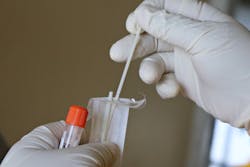Researchers at Johns Hopkins Medicine, the University of Maryland Medical Center, the University of Maryland School of Medicine and four other collaborators report that a rapid antigen detection test for SARS-CoV-2, the virus that causes COVID-19, proved more effective than expected when compared with virus detection rates using a polymerase chain reaction (PCR) assay, according to a news release from Johns Hopkins Medicine.
The study was posted online in the American Society for Microbiology journal Microbiology Spectrum. The study involved some 6,000 patients seen at the Baltimore Convention Center Field Hospital (BCCFH) during a 10-day period around the beginning of 2021.
“We found that virus was accurately detected by the rapid antigen test in 87% of patients with COVID-19 symptoms and in 71% of those who were asymptomatic — rates that surprised us because they were so high,” says study lead author Zishan Siddiqui, MD, Assistant Professor of Medicine at the Johns Hopkins University School of Medicine. “This is a significant finding because the rapid test offers a number of advantages over the PCR test, including time savings, both in sampling and processing; cost savings; and most importantly, ease of distribution and application — basically anywhere — which can help overcome COVID testing disparities in medically underserved communities.”
The first step for both the PCR and rapid antigen tests is obtaining a sample from a patient, either a nasal swab or a bit of saliva. The difference lies in how the sample is processed and analyzed. A PCR test takes a tiny bit of SARS-CoV-2 genetic material from a sample and reproduces it thousands of times so it can be more easily detected. A rapid antigen test uses laboratory-produced antibodies to seek out and latch onto proteins on the surface of SARS-CoV-2 particles in the sample.
The question that the new study hoped to answer was which test could be most broadly, most quickly and most effectively applied to a large community such as Baltimore.
To do this, the researchers administered both the rapid antigen and PCR detection methods to just over 6,000 people who came to the Baltimore field hospital for COVID testing between Dec. 23, 2020, and Jan. 11, 2021. Participants were screened for possible exposure to the coronavirus and COVID-19 symptoms. Staff members performing the tests were trained exactly the same and monitored during test administration to ensure quality control and reliable results.
Operated since April 2020 as a collaboration between Johns Hopkins Medicine, the University of Maryland Medical System and the Maryland Department of Health, the BCCFH provided COVID-19 testing, monoclonal antibody infusion therapy and vaccinations to Baltimore-area residents, including those in medically underserved communities.
“The accuracy of the rapid antigen test was mostly unknown when we started the study in December 2020,” says Siddiqui. “We shared our findings with the Maryland Department of Health and in scientific meetings a month later, and before the results of any similar studies were available. I believe this influenced the state’s strategy on how best to use the rapid antigen tests available to them.”
Siddiqui and colleagues are comparing rapid antigen and PCR testing in pediatric patients, with data collected on about 1,000 children so far. They hope to publish their findings early in 2022.
In another study, the researchers plan to assess the accuracy of rapid antigen tests being marketed for home use.
The rapid antigen test used in this study is the BinaxNOW COVID-19 Antigen Test manufactured by Abbott Laboratories.

